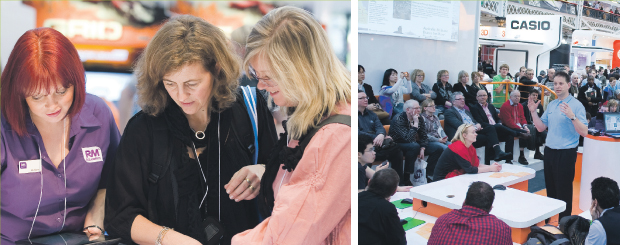BETT Show 2012 replaces traditional seminars with a number of interactive sessions known collectively as LearnLive.
The format hopes to discourage static presentations and open up more opportunities both for networking and intelligent discussion between participants.
Visitors can influence each session by contacting a programme ‘leader’ through Twitter or youbett, an online social community designed specifically for the event.
It’s been suggested that these platforms could be used to change the content and format of a session, ask speakers a question or debate with other members.
Debbie French, BETT Event Director said: “Teachers belong to one of the few professions that does not provide mandatory training and development after initial qualification.
“The BETT team works closely with the sector’s key stakeholders each year to design a seminar programme that is sure to see educators leave the show with improved knowledge, understanding and skills that will be practical, relevant and applicable to their current role or career aspiration.”
The seminars kicks off on the morning of January 11 with “Creating a self organized learning environment”, led by Shaz Lawrence, Professional Development Trainer at Catholic Telemedia Network (USA).
The method of self organized learning, originally highlighted by Sugata Mitra’s ‘hole in the wall’ experiments in India, has shown that children can learn to do almost anything on their own provided they’re given shared digital resources.
The event will focus on how to encourage students to take responsibility for their own learning, and how teachers can act as facilitators in the process.
Andy Palmer, BT’s head of learning and skills and Executive Board Member for Ofsted, will later discuss the best ways to use technology and argue that at present, the technology-based skills emerging from the education system are not good enough.
Leadership is just as important as teaching, which is why Brian Lightman, General Secretary of the Association of School and College Leaders (ASCL), will be speaking about “the importance of the new technologies in the strategic leadership of schools and colleges.”
Mr Lightman will share his experiences alongside successful head teachers, Governors and Technology Industry specialists, as well as pose several questions about the future of digital technology in the sector.
The third day will be the last chance for delegates to knuckle down and learn before the weekend kicks in.
One of the more unique seminars will be held by Morten Søby, the Director General of The Norwegian Centre for ICT in Education, which is an executive agency of Norway’s Ministry of Education and Research.
Mr Søby will share the latest research and examples from Norway, as well as discussing how technology is influencing digital competence.
Other sessions of note include the use of web 2.0 tools to engage reluctant writers and increase parental engagement, how to control Wi-Fi access on campus, and making best use of ICT to support dyslexic learners.
Students are consistently asked to switch their mobile phones off when entering a lecture or classroom.
On the final day Kevin Brunton, Disability Needs Assessor and Disability IT Co-ordinator at London Metropolitan University will be arguing why mobile phones should be kept on, by highlighting a number of apps which increase engagement and learning potential.
Four days and more than eighty seminars means that LiveLearn should cater for everyone. The sheer scope and diversity of the programme highlights just how important technology is, and will no doubt continue to be for further education.
Read an interview with Debbie French, the event Director at BETT.
Education Leaders Conference at BETT
The BETT Education Leaders Conference is a specific two day exhibition for head teachers, principals and leading representatives of the sector.
The event takes place alongside the trade show and LearnLive seminars, offering delegates a number of presentations, discussions and master class sessions with leading figures from further education.
Michael Gove MP, Secretary of State for Education, will give an opening address tailored to the education workforce and the organisations which supply educators with products and services.
Martin Doel, Chief Executive of the Association of Colleges (AoC), will then be running a master class on how to ensure students have all the skills that employers want. The session, titled ‘Enhancing the Employability of your Students: Working with Partners in Industry and Commerce’ will look at the experiences Mr Doel has gained from working closely with FE colleges and local businesses, and how this can be used to improve qualifications.
This will lead into a round table discussion addressing the many challenges and changes facing colleges in the future. Delegates will be able to engage and debate with a panel of high-profile speakers including Mary Bousted, General Secretary of the Association of Teachers and Learners (ATL), Rachel Wolf, Director of the New Schools Network and Mr Doel.
Debbie French, BETT Event Director said: “With such a large number of recent changes to education policy, it is important that education professionals have the opportunity to collaborate and discuss the issues that will affect them.
“Education Leaders at BETT is the perfect place to do this.”
The second day will open with a discussion about the effective deployment of ICT in flexible learning spaces. Hosted by John Sibbald, Head of Specialism and Post-16 Learning at Manchester Communication Academy and Sian Bristow, Lead Professional for Mathematics, Manchester Communication Academy, the morning master class will look at how technology can be used to maximise the investment in a particular college space.
More than 500 school leaders attended the Education Leaders Conference last year, and event organisers hope they’ll beat that next week.
The conference is free of charge and open to all school and college leaders, senior DfE officials, leading representatives from teaching, parent and governor associations and leading researchers from policy institutes/think tanks.



Your thoughts